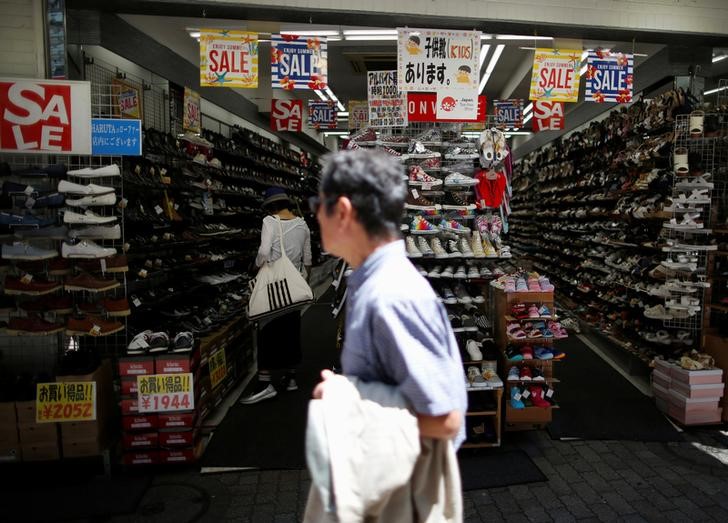By Takashi Umekawa and Leika Kihara
TOKYO (Reuters) - Japan's government is expected to cut its consumer inflation forecast for the current fiscal year and produce an estimate for fiscal 2017 that is much lower than the central bank's 2 percent target, government sources told Reuters on Tuesday.
The gloomy government assessment may add to market doubts over the Bank of Japan's optimistic price forecasts and step up pressure on the central bank to expand stimulus this month as it struggles to fend off deflationary risks.
In draft forecasts to be finalised at a cabinet meeting on Wednesday, the government projects consumer inflation of 0.4 percent for the current fiscal year ending in March 2017, down from 1.2 percent projected in January, the sources said.
The downgrade likely reflects weaker-than-expected economic growth and the impact of external factors such as slumping oil prices and the strong yen, which is pushing down import costs.
Sources said the government projects consumer inflation of 1.4 percent for fiscal 2017, well below the 2 percent target the BOJ says will be met during that year.
The government was not immediately available for comment.
Markets are simmering with speculation that the BOJ will cut its inflation forecasts and expand its already massive stimulus program at a rate review on July 28-29, as a hit to exports from a strong yen and weak consumption have added to downward pressure on the economy and prices.
Visiting former U.S. Federal Reserve Chairman Ben Bernanke told Prime Minister Shinzo Abe on Tuesday that the BOJ still had tools left available to beat deflation.
Easing policy now would coincide with Abe's plan to lay out a fiscal stimulus package this month to address weak growth.
"Mr. Bernanke said Japan should boost nominal gross domestic product with fiscal policy and, in coordination with that use monetary policy since the BOJ has various means available to ease policy," Japan's top government spokesman told reporters.
In the draft estimates, the government expects the economy to expand 0.9 percent in the current fiscal year, down sharply from 1.7 percent projected in January, the sources said.
The government usually produces economic and price estimates in January, which serve as a basis for compiling the state budget, and revises them around mid-year.
The government produces its forecasts using the overall consumer price index, while the BOJ uses the core consumer price index that strips away the effect of volatile fresh food prices.
In its last projections made in April, the BOJ projected core consumer inflation of 0.5 percent in fiscal 2016 and 1.7 percent the following year. Analysts expect those estimates to be revised later this month.
The BOJ has pushed back the timing for hitting its 2 percent target several times, most recently in April, when it delayed it by six months, citing falling oil prices.
Japan's economy expanded at the fastest pace in a year in the first quarter, but analysts say growth will not pick up much for the rest of this year on weak consumer spending and external headwinds like the strong yen.

Household inflation expectations have weakened and core consumer prices fell 0.4 percent in May from a year earlier, marking the biggest drop since 2013, keeping the BOJ under pressure to ease policy.